版权所有:内蒙古大学图书馆 技术提供:维普资讯• 智图
内蒙古自治区呼和浩特市赛罕区大学西街235号 邮编: 010021

作者机构:Sun Yat Sen Univ Guangdong Engn Ctr Petrochem Energy Conservat Sch Mat Sci & Engn Guangzhou 510275 Guangdong Peoples R China Sun Yat Sen Univ Sch Chem Engn & Technol Zhuhai 519082 Guangdong Peoples R China Shanghai Jiao Tong Univ Coll Smart Energy Shanghai 200240 Peoples R China
出 版 物:《ENERGY CONVERSION AND MANAGEMENT》 (能量转换与管理)
年 卷 期:2022年第260卷
页 面:1页
核心收录:
学科分类:0820[工学-石油与天然气工程] 08[工学] 0807[工学-动力工程及工程热物理] 0801[工学-力学(可授工学、理学学位)]
基 金:National Natural Science Foundation of China
主 题:Low-grade heat utilization Heat pump Low-low pressure steam generation Heat exchange networks Mixed-integer non-linear programming
摘 要:Recovery and utilization of low-grade heat in the process industries offers considerable economic and environmental benefits. Low-grade heat utilization employs circulating medium for heat transfer between heat sources and sinks. Thus, it is in need to synchronously integrate heat sources, circulating medium and heat sinks. It is extremely challenging for optimal design of low-grade heat utilization systems (LHUS) when considering quantity and quality of heat sources, heat sink requirements, feasible integration technologies and economic performance simultaneously. The current design methods for low-grade heat utilization integrated with upgrading technologies are simplified, narrowing down their integration domain. In this work, integration strategy of LHUS with heat pump technology is first proposed. A novel methodology for optimal design of heat pump integrated low-grade heat utilization systems (HPiLHUS) is developed subsequently for implementing the integration strategy. A modified superstructure characterized by nodes, low-low pressure steam (LLPS) generation module and a heat pump system is presented. The node acts as mixer, splitter or heat exchanger, and thus enables HPiLHUS optimization in all feasible domain. The LLPS generation module provides a promising integration possibility for heat pump technology. The heat pump system aims to upgrade low-grade heat in order to improve energy utilization efficiency. A mixed-integer non-linear programming (MINLP) model is formulated for optimal design of LHUS/HPiLHUS. Real-world case studies are employed to demonstrate our method s efficacy and applicability. The results show that integration of heat pump technology with LHUS reduces total annual cost (TAC) by 12.2%, demonstrating huge potential for reduction of energy consumption. Scenario analysis exhibit the advantages of our proposed modified method over conventional methods. Sensitivity analysis shows LLPS generation temperature and excavated heat sink duty hav